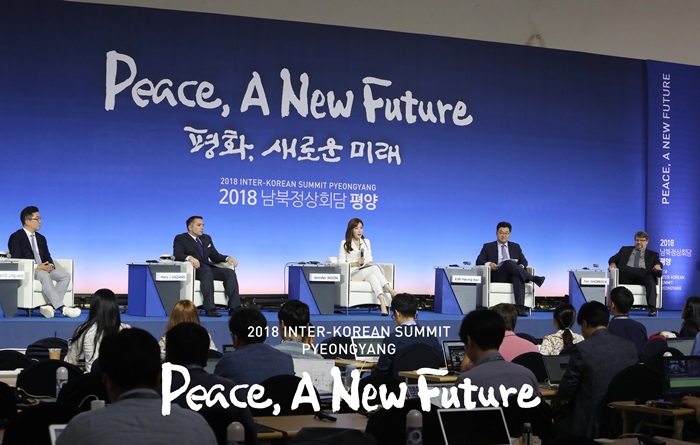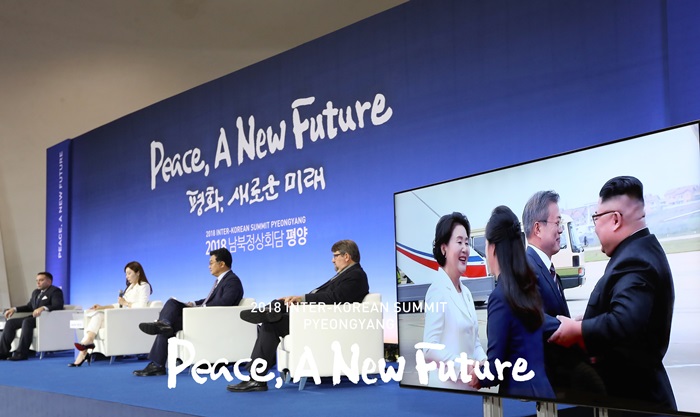Experts call Pyeongyang Summit a success

Experts from at home and abroad agree on the outcomes of the 2018 Inter-Korean Summit Pyeongyang, in a panel discussion at the main press center in Seoul on Sept. 20. (Pyeongyang Press Corps)
By Pyeongyang Press Corps
"A great leap." "A great start." "A tremendous step to take."
These are some of the many positive reactions from experts specializing in Korean issues when the results of the Pyeongyang Joint Declaration of September 18 came to light.
On Sept. 20 at the Seoul-based main press center for the 2018 Inter-Korean Summit Pyeongyang, five experts had very positive views of the Pyeongyang Summit, saying that, "Significant progress has been made toward peace and denuclearization in the region this time."
All five experts were sharing their insights on the theme of "the achievements of the Pyeongyang Summit and prospects for the future of inter-Korean and U.S.-North Korea relations.”
"I was really moved to see what was happening in Pyeongyang and the interaction between President Moon Jae-in and North Korean Chairman Kim Jong Un. It’s really amazing to read the military statement about the easing of military tension," said Tim Shorrock, a U.S. journalist. "It's a good sign that the peoples of both nations stood up and that they're moving forward on their own.”
Professor of political science and diplomacy Kim Heung-kyu at Ajou University said that, "As President Moon said, this historic summit will change the trajectory of the inter-Korean relationship from confrontation toward cooperation and reconciliation. We could not have really imagined this last year, as we were on the brink of war. Now, we're witnessing a new era in the relationship between the two countries.”
The participants all agreed that the role of President Moon Jae-in at the Pyeongyang Summit was quite successful.
"The role of President Moon changed from a mediator to much more of a facilitator. It's a good beginning and a great leap in the relationship," said Professor Kim. "I think what President Moon has done is really historic and a miracle. This process will continue moving forward," said Harry Kazianis, director of defense studies at the Center for the National Interest.
"President Moon's task was to put the stalled U.S.-North Korea dialogue back together, and he did it. President Moon was, in fact, successful and accomplished the hardest thing he faced as part of his mission in Pyeongyang," said Scott Snyder, senior fellow for Korea studies at the Council on Foreign Relations.

Korean and non-Korean experts speak about prospects for the future inter-Korean and U.S.-North Korean relationships following the Pyeongyang Summit, during a panel discussion at the main press center in Seoul on Sept. 20. (Pyeongyang Press Corps)
Snyder and other panelists agreed that the Pyeongyang Declaration jointly signed by the South and North Korean leaders would bring quite a big change to the impasse that Washington and Pyeongyang have recently hit.
Snyder predicted that President Moon would mediate and facilitate talks between the two sides at the U.N. General Assembly in New York he was to attend, which would lead to another U.S.-North Korea summit. Other experts also called it a "good sign" when U.S. Secretary of State Mike Pompeo issued a statement about the Pyeongyang Summit that showed his willingness to resume talks with North Korean officials.
Mentioning from the declaration the phrase “dismantling the nuclear facilities in Yeongbyeon, as the United States takes corresponding measures,” Shorrock said, "I think the U.S. is considering very seriously what their corresponding measures are going to be to get this discussion moving."
"They've gotten stuck on this issue recently. The U.S. says that North Korea must denuclearize first and it must show a positive move toward denuclearization before anything happens. I think a more step-by-step process may be happening from Pyeongyang. I think that's only for the good. It's the only way it's going to resolve this, I believe."
Woo Jung-Yeop, head of the Sejong Institute's Department of Security Strategy Studies, said that, "The question is how and what we are going to get out of a possible second meeting between U.S. President Donald Trump and Chairman Kim. The issue is what can be exchanged at the summit, because North Korea has not really specified what they want in exchange for what can be provided by the U.S."

